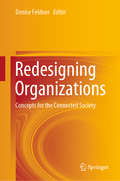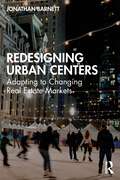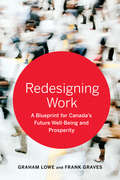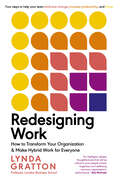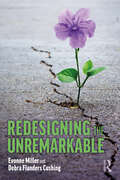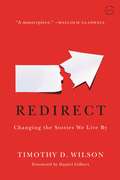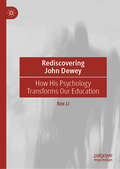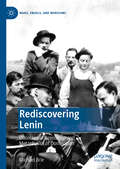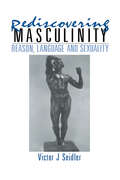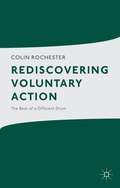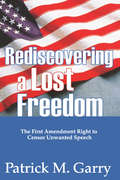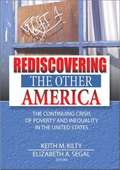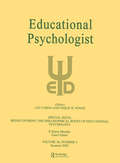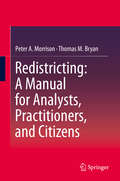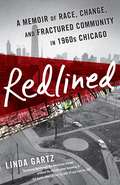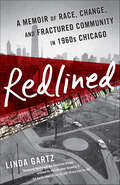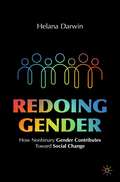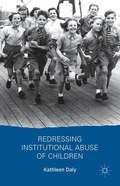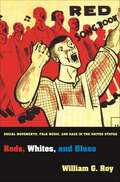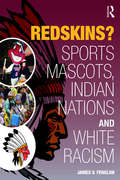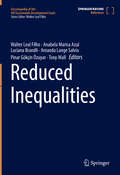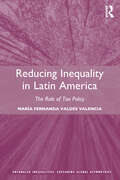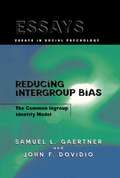- Table View
- List View
Redesigning Organizations: Concepts for the Connected Society
by Denise FeldnerThis book offers readers a deeper understanding of the Cyberspace, of how institutions and industries are reinventing themselves, helping them excel in the transition to a fully digitally connected global economy. Though technology plays a key part in this regard, societal acceptance is the most important underlying condition, as it poses pressing challenges that cut across companies, developers, governments and workers. The book explores the challenges and opportunities involved, current and potential future concepts, critical reflections and best practices. It addresses connected societies, new opportunities for governments, the role of trust in digital networks, and future education networks. In turn, a number of representative case studies demonstrate the current state of development in practice.
Redesigning Urban Centers: Adapting to Changing Real Estate Markets
by Jonathan BarnettRedesigning Urban Centers: Adapting to Changing Real Estate Markets describes how well-managed places which offer clean, safe, and attractively designed streets and public spaces, along with reinvented zoning, are drawing real estate investors and developers to reimagined legacy downtowns, innovation districts, edge cities becoming real cities, suburban shopping streets turning into mixed-use centers, urban districts near airports, and bypassed downtowns relying on government support. Case studies from the Philadelphia metropolitan region, plus examples from across the U.S., demonstrate how designs which integrate offices, housing, shopping, hotels, and entertainment, along with cultural and other attractions, transform places where people have to be into places where people want to be.This book will interest leaders of business improvement districts and Main Street organizations, planning officials, urban design practitioners, and instructors and students of planning, economic development, and urban design.
Redesigning Work: A Blueprint for Canada's Future Well-being and Prosperity
by Graham Lowe Frank GravesCanada's future prosperity is of utmost concern to citizens, industry leaders and policy makers. Using original public opinion research from EKOS, Redesigning Work argues that improving people's jobs and workplaces can unlock the potential to strengthen Canada's economy and improve the well-being of Canadians. Graham Lowe and Frank Graves are two of Canada's leading experts on work and public opinion. In Redesigning Work the authors provide a blueprint for the future of work in Canada by identifying practical ways to make work more motivating, rewarding and productive. The authors provide fuel for employers, workers, policy makers, HR professionals, and NGOs to combat the negative trends many Canadians associate with their future economic prospects. The book paints an optimistic picture of the future of work by addressing job stress, work-life balance, skill use and engagement.
Redesigning Work: How to Transform Your Organization and Make Hybrid Work for Everyone (Management on the Cutting Edge)
by Lynda GrattonHow do we make the most of the greatest global shift in the world of work for a century and radically redesign the way we work—forever?Professor Lynda Gratton is the global thought-leader on the future of work. Drawing on thirty years of research into the technological, demographic, cultural, and societal trends that are shaping work and building on what we learned through our experiences of the pandemic, Gratton presents her innovative four-step framework for redesigning work that will help you: • Understand your people and what drives performance • Reimagine creative new ways to work • Model and test these approaches within your organization • Act and create to ensure your redesign has lasting benefits Gratton presents real-world case studies that show companies grappling with work challenges. These include the global bank HSBC, which built a multidisciplinary team to understand the employee experience; the Japanese technology company Fujitsu, which reimagined three kinds of &“perfect&” offices; and the Australian telecommunications company Telstra, which established new roles to coordinate work across the organization. Whether you&’re working in a small team or running a multinational, Redesigning Work is the definitive book on how to transform your organization and make hybrid working work for you.
Redesigning the Unremarkable
by Debra Flanders Cushing Evonne MillerRedesigning the Unremarkable is a timely and necessary reminder that the often neglected elements and spaces of our built environment – from trash bins, seats, stairways, and fences to streets, bikeways, underpasses, parking lots, and shopping centres – must be thoughtfully redesigned to enhance human and planetary health. Using the lens of sustainable, salutogenic, and playable design, in this inspiring book, Miller and Cushing explore the challenges, opportunities, and importance of redesigning the unremarkable. Drawing on global research, theory, practical case studies, photographs, and personal experiences, Redesigning the Unremarkable is a vital text – a doer’s guide – for researchers, policymakers, and practitioners wanting to transform and positively reimagine our urban environment.
Redirect: Changing the Stories We Live By
by Timothy D. Wilson"There are few academics who write with as much grace and wisdom as Timothy Wilson. REDIRECT is a masterpiece." -Malcolm GladwellWhat if there were a magic pill that could make you happier, turn you into a better parent, solve a number of your teenager's behavior problems, reduce racial prejudice, and close the achievement gap in education? There is no such pill, but story editing - the scientifically based approach described in REDIRECT - can accomplish all of this.The world-renowned psychologist Timothy Wilson shows us how to redirect the stories we tell about ourselves and the world around us, with subtle prompts, in ways that lead to lasting change. Fascinating, groundbreaking, and practical, REDIRECT demonstrates the remarkable power small changes can have on the ways we see ourselves and our environment, and how we can use this in our everyday lives.ate, increased teen pregnancy, and even hastened people's deaths-in part by failing to redirect people's stories in healthy ways. In short, Wilson shows us what works, what doesn't, and why. Fascinating, groundbreaking, and practical, Redirect demonstrates the remarkable power small changes can have on the ways we see ourselves and the world around us, and how we can use this in our everyday lives. In the words of David G. Myers, "With wit and wisdom, Wilson shows us how to spare ourselves worthless (or worse) interventions, think smarter, and live well."
Rediscovering John Dewey: How His Psychology Transforms Our Education
by Rex LiThis book tries to trace Dewey’s intellectual history from his early years to the end, focusing on the themes of psychology and the psychological aspect of education in Dewey’s lifelong writing.The author mixed the discussion on Dewey’s work with his life stories and shows readers how his ideas evolved over time. In turn, the book offers a critical review of his ideas in the areas of psychology and education. Lastly, it assesses Dewey’s involvement in and impact on education. In short, it provides a comprehensive account of his legacy in psychology and education.
Rediscovering Lenin: Dialectics of Revolution and Metaphysics of Domination (Marx, Engels, and Marxisms)
by Michael BrieTranslated from the original German Lenin Neuentdecken and available in English for the first time, this volume rediscovers Lenin as a strategic socialist thinker through close examination of his collected works and correspondence. Brie opens with an analysis of Lenin's theoretical development between 1914 and 1917, in preparation for his critical decision to dissolve the Constituent Assembly in January 1918 in a struggle for power. This led from the dialectics of revolutionary practice and social analysis to a new understanding of socialism, which is compared and contrasted to the alternative Marxist ideas and conceptions of the state posited by Karl Kautsky and Rosa Luxemburg. Rediscovering Lenin then moves to 1921, when Lenin begins a new stage of his theoretical development concerned with resolving the reversal of the revolution’s aims and its results. This process remains unfinished, and the questions raised a hundred years ago remain: How can one intervene successfully and responsibly in social and political crises? What role do social science theories, ideological frameworks, and other practices play in transforming the economic, political and cultural power structures of a society? Brie concludes with a retrospective on the ideas developed by Marx and in the Second International, and their impact on Lenin’s strategic thinking. Placing Lenin's writing itself in the foreground and arguing from inside his own self-learning, Rediscovering Lenin focuses on the reflective relationship between ideology, theory, and practice.
Rediscovering Masculinity: Reason, Language and Sexuality
by Victor J. SeidlerFirst published in 2004. Routledge is an imprint of Taylor & Francis, an informa company.
Rediscovering Voluntary Action
by Colin RochesterVolunteering and voluntary organizations have become increasingly important in British social and political life but at a cost. Greater prominence has led to a narrow and distorted view of what voluntary action involves and how it is undertaken. This book reasserts the case for a broader view of voluntarism as a unique set of autonomous activities.
Rediscovering a Lost Freedom: The First Amendment Right to Censor Unwanted Speech
by Patrick GarrySince ratification of the First Amendment in the late eighteenth century, there has been a sea change in American life. When the amendment was ratified, individuals were almost completely free of unwanted speech; but today they are besieged by it. Indeed, the First Amendment has, for all practical purposes, been commandeered by the media to justify intrusions of offensive speech into private life.In its application, the First Amendment has become one-sided. Even though America is virtually drowning in speech, the First Amendment only applies to the speaker's delivery of speech. Left out of consideration is the one participant in the communications process who is the most vulnerable and least protected--the helpless recipient of offensive speech. In Rediscovering a Lost Freedom, Patrick Garry addresses what he sees as the most pressing speech problem of the twenty-first century: an often irresponsible media using the First Amendment as a shield behind which to hide its socially corrosive speech. To Garry, the First Amendment should protect the communicative process as a whole. And for this process to be free and open, listeners should have as much right to be free from unwanted speech as speakers do of not being thrown in jail for uttering unpopular ideas.Rediscovering a Lost Freedom seeks to modernize the First Amendment. With other constitutional rights, changed circumstances have prompted changes in the law. Restrictions on political advertising seek to combat the perceived influences of big money; the Second Amendment right to bear arms, due to the prevalence of violence in America, has been curtailed; and the Equal Protection clause has been altered to permit affirmative action programs aimed at certain racial and ethnic groups. But when it comes to the flood of violent and vulgar media speech, there has been no change in First Amendment doctrines. This work proposes a government-facilitated private right to censor. Redisco
Rediscovering the Other America
by Elizabeth A. Segal Keith M. KiltyLearn why it is imperative to bring a progressive focus back to social welfare policy! This vital book explores recent research on poverty and inequality, identifies strategies for ensuring adequate services, and challenges many of the inaccurate beliefs that were used to justify welfare reform legislation in 1996. You'll find up-to-date information on various marginalized groups and their social problems, including lack of health coverage for women with mental health, substance abuse, and domestic violence problems. In addition, you'll find data on the health coverage situation for the poor, for Appalachians, and for women in general. Finally, Rediscovering the Other America: The Continuing Crisis of Poverty and Inequality in the United States suggests strategies for changing public perceptions about the nature of poverty and the poor. From the editors: "In 1962, Michael Harrington published The Other America, which documented how deeply entrenched poverty and inequality were in one of the wealthiest countries in the world. Four decades later, we find it necessary once again to rediscover this profound social condition. The purpose of this book is to awaken policymakers and the public to this situation once again, in order to affect the nature of public policies dealing with these issues." Rediscovering the Other America: The Continuing Crisis of Poverty and Inequality in the United States covers a wide range of issues, some similar to what Harrington described in 1962 and some reflecting recent social, political, and economic developments.
Rediscovering the Philosophical Roots of Educational Psychology: A Special Issue of educational Psychologist
by Lyn Corno P. Karen Murphy Philip H. WinneIn the early years of this new millennium, as the field of educational psychology continues to define its place within the educational enterprise, it is imperative that those in the field reflect on the foundation of their domain. This special issue can help keep the lessons of the past squarely in their minds and thus contribute to needed reflection and subsequent dialogue on the proper place of philosophy in the stream of educational psychology. The contents are both diverse and well conceived, beginning with a talk to educational psychologists that is suitably complemented by four articles that recognize certain compelling issues. The depth and variety of those articles, along with insightful commentaries, are touchstones for educational psychologists interested in the roots of the domain and in the links between current trends and philosophical thought.
Redistricting: A Manual for Analysts, Practitioners, and Citizens
by Peter A. Morrison Thomas M. BryanThis comprehensive manual provides a user-oriented overview of U.S. Census data and demographic methods for redistricting applications. It addresses current issues and concerns accompanying the creation, adjustment, and evaluation of election districts and plans that incorporate them using 2020 Federal Census data. It meets the needs of local governments, citizen redistricting commissions, parties to litigation, and practitioners using Census data for political redistricting. The book provides many examples of technical problems that analysts will encounter when applying these data, supplemented by extensive case studies illustrating these technical issues and how they can be addressed. The book is a source to consult for insight, background, and concrete examples of specific issues and concerns and how to address them. As such this comprehensive reference manual is a "must have" for applied demographers, data scientists, statisticians, citizen redistricting commissions, parties to litigation, practitioners, and any analyst or organization engaged in political redistricting using US decennial census data.Prepublication quotes:“As a litigator who advises local governments on redistricting matters, this book is an essential resource.” John A. Safarli, Partner, Floyd, Pflueger & Ringer, P.S., Seattle, WA “A valuable primer for those who will participate in redistricting. Provides those new to the highly-charged work of drawing districts an understanding of what is at stake, what options exist and the pitfalls to avoid.” Professor Charles S. Bullock, III, University of Georgia (author of Redistricting: The Most Political Activity in America) “A meticulously researched, well-structured and informative foray into the nuts and bolts of the redistricting process. . .Will aid the bench and bar, public officials, and those elected and appointed citizens who are entrusted with the heavy responsibilities of redistricting from start to finish.Lives up to its name as a pragmatic guide for those involved in the redistricting process, be they demographic experts, statistical analysts, election law attorneys, litigants, or citizens involved in redistricting commissions. A resource for teaching election law and for defending governmental entities ensnared in the redistricting process.A must for anyone engaged in political redistricting based on the 2020 U.S. Census data.” Benjamin E. Griffith, Adjunct Professor of Election Law, University of Mississippi, Robert C. Khayat School of Law, and Principal in Griffith Law Firm, Oxford, Mississippi. (Editor and Author of America Votes! Challenges to Modern Election Law and Voting Rights, ABA Section of State & Local Government Law, 4th Ed., December 2019)
Redlined: A Memoir of Race, Change, and Fractured Community in 1960s Chicago
by Linda GartzAs blacks moved deeper into Chicago's West Side during the 1960s, whites fled by the thousands--but Linda Gartz's parents, Fred and Lil, chose to stay in their integrating neighborhood. Redlined is a riveting story of a community fractured by racial turmoil, an unraveling and conflicted marriage, and a daughter's fight for sexual independence--an up-close, intimate view of the racial and social upheavals of the 1960s.
Redlined: A Memoir of Race, Change, and Fractured Community in 1960s Chicago
by Linda GartzSet against the backdrop of the Civil Rights Movement, Redlined exposes the racist lending rules that refuse mortgages to anyone in areas with even one black resident. As blacks move deeper into Chicago’s West Side during the 1960s, whites flee by the thousands. But Linda Gartz’s parents, Fred and Lil choose to stay in their integrating neighborhood, overcoming previous prejudices as they meet and form friendships with their African American neighbors. The community sinks into increasing poverty and crime after two race riots destroy its once vibrant business district, but Fred and Lil continue to nurture their three apartment buildings and tenants for the next twenty years in a devastated landscape—even as their own relationship cracks and withers. After her parents’ deaths, Gartz discovers long-hidden letters, diaries, documents, and photos stashed in the attic of her former home. Determined to learn what forces shattered her parents’ marriage and undermined her community, she searches through the family archives and immerses herself in books on racial change in American neighborhoods. Told through the lens of Gartz’s discoveries of the personal and political, Redlined delivers a riveting story of a community fractured by racial turmoil, an unraveling and conflicted marriage, a daughter’s fight for sexual independence, and an up-close, intimate view of the racial and social upheavals of the 1960s.
Redoing Gender: How Nonbinary Gender Contributes Toward Social Change
by Helana DarwinRedoing Gender demonstrates how difficult it is to be anything other than a man or a woman in a society that selectively acknowledges those two genders. Gender nonbinary people—who identify as other genders besides simply “man” or “woman”—have begun to disrupt this binary system, but the limited progress they have made has required significant everyday labor. Through interviews with 47 nonbinary people, this book offers rich description of these forms of labor, including “rethinking sex and gender,” “resignifying gender,” “redoing relationships,” and “resisting erasure.” The final chapter interrogates the lasting impact of this labor through follow-up interviews with participants four years later. Although nonbinary people are finally managing to achieve some recognition, it is clear that this change has not happened without a fight that continues to this day. The diverse experiences of nonbinary people in this book will help cisgender people relate to gender minorities with more compassion, and may also appeal to those questioning their own gender. This text will also be of keen interest to academics across Sociology and Gender Studies.
Redressing Institutional Abuse Of Children
by Kathleen DalyWinner of the Christine M. Alder Book Prize in 2015 from the Australian and New Zealand Society of Criminology Historical abuse of children is a worldwide phenomenon. This book assesses the enablers of abuse and the reasons it took so long for officials to respond. It analyzes redress for institutional abuse in two countries, Canada and Australia, using first-hand accounts of survivors' experiences.
Reds, Whites, and Blues: Social Movements, Folk Music, and Race in the United States (Princeton Studies in Cultural Sociology #45)
by William G. RoyMusic, and folk music in particular, is often embraced as a form of political expression, a vehicle for bridging or reinforcing social boundaries, and a valuable tool for movements reconfiguring the social landscape. Reds, Whites, and Blues examines the political force of folk music, not through the meaning of its lyrics, but through the concrete social activities that make up movements. Drawing from rich archival material, William Roy shows that the People's Songs movement of the 1930s and 40s, and the Civil Rights Movement of the 1950s and 60s implemented folk music's social relationships--specifically between those who sang and those who listened--in different ways, achieving different outcomes. Roy explores how the People's Songsters envisioned uniting people in song, but made little headway beyond leftist activists. In contrast, the Civil Rights Movement successfully integrated music into collective action, and used music on the picket lines, at sit-ins, on freedom rides, and in jails. Roy considers how the movement's Freedom Songs never gained commercial success, yet contributed to the wider achievements of the Civil Rights struggle. Roy also traces the history of folk music, revealing the complex debates surrounding who or what qualified as "folk" and how the music's status as racially inclusive was not always a given. Examining folk music's galvanizing and unifying power, Reds, Whites, and Blues casts new light on the relationship between cultural forms and social activity.
Redskins?: Sport Mascots, Indian Nations and White Racism (New Critical Viewpoints on Society)
by James V FenelonThis book assesses the controversies over the Washington NFL team name as a window into other recent debates about the use of Native American mascots for professional and college sports teams. Fenelon explores the origin of team names in institutional racism and mainstream society’s denial of the impact of four centuries of colonial conquest. Fenelon’s analysis is supported by his surveys and interviews about the "Redskins" name and Cleveland "Indians" mascot "Chief Wahoo." A majority of Native peoples see these mascots as racist, including the National Congress of American Indians—even though mainstream media and public opinion claim otherwise. Historical analysis divulges these terms as outgrowths of "savage" and "enemy icon" racist depictions of Native nations. The book ties the history of conquest to idealized claims of democracy, freedom, and "honoring" sports teams.
Reduce Inequality, Increase Economic Growth: A Conversation with Joseph Stiglitz
by Joseph Stiglitz Shari SpiegelJoseph Stiglitz, winner of the Nobel Prize for Economics, discusses the state of the world's economy in this interview, offering policy interventions to better serve society's economic needs. Pointing to a grave failure of modern macroeconomic theory to predict the financial crisis, Stiglitz calls for new economic models from within the field to build a framework that maximizes individual capacity and advances society's interests.
Reduced Inequalities (Encyclopedia of the UN Sustainable Development Goals)
by Walter Leal Filho Tony Wall Luciana Brandli Anabela Marisa Azul Amanda Lange Salvia Pinar Gökçin ÖzuyarThe problems related to the process of industrialisation such as biodiversity depletion, climate change and a worsening of health and living conditions, especially but not only in developing countries, intensify. Therefore, there is an increasing need to search for integrated solutions to make development more sustainable. The United Nations has acknowledged the problem and approved the “2030 Agenda for Sustainable Development”. On 1st January 2016, the 17 Sustainable Development Goals (SDGs) of the Agenda officially came into force. These goals cover the three dimensions of sustainable development: economic growth, social inclusion and environmental protection. The Encyclopedia of the UN Sustainable Development Goals comprehensively addresses the SDGs in an integrated way. The Encyclopedia encompasses 17 volumes, each one devoted to one of the 17 SDGs. This volume addresses SDG 10, namely "Reduce inequality within and among countries", but also includes inequalities in income as well as those based on age, sex, disability, race, ethnicity, origin, religion or economic or other status within a country. The Goal also addresses inequalities among countries, including those related to representation, migration and development assistance. This volume contains the description of a range of terms, to allow a better understanding and foster knowledge about it.Concretely, the identified targets are:Progressively achieve and sustain income growth of the bottom 40 per cent of the population at a rate higher than the national averageEmpower and promote the social, economic and political inclusion of all, irrespective of age, sex, disability, race, ethnicity, origin, religion or economic or other statusEnsure equal opportunity and reduce inequalities of outcome, including by eliminating discriminatory laws, policies and practices and promoting appropriate legislation, policies and action in this regardAdopt policies, especially fiscal, wage and social protection policies, and progressively achieve greater equalityImprove the regulation and monitoring of global financial markets and institutions and strengthen the implementation of such regulationsEnsure enhanced representation and voice for developing countries in decision-making in global international economic and financial institutions in order to deliver more effective, credible, accountable and legitimate institutionsFacilitate orderly, safe, regular and responsible migration and mobility of people, including through the implementation of planned and well-managed migration policiesImplement the principle of special and differential treatment for developing countries, in particular least developed countries, in accordance with World Trade Organization agreementsEncourage official development assistance and financial flows, including foreign direct investment, to states where the need is greatest, in particular least developed countries, African countries, small island developing states and landlocked developing countries, in accordance with their national plans and programmesReduce to less than 3 per cent the transaction costs of migrant remittances and eliminate remittance corridors with costs higher than 5 per centEditorial BoardMd. Mahmudul Alam, Olga Bialostocka, José Baltazar Salgueirinho Osório de Andrade Guerra, Narasimha Reddy Donthi, Ulla A. Saari, Daniele Vieira, Amanda Lange Salvia
ReducedEffort® Changeover: The Lean Way to Quickly Reduce Changeover Downtime, Second Edition
by Ron HeiskellReducedEffort® Changeover: The Lean Way to Quickly Reduce Changeover Downtime provides a step-by-step guide for conducting a Kaizen event that empowers the people who do the work to improve how that work is done. Packed with tips, tools, and examples, this practical guide begins with a clear description of the Lean principles underlying the ReducedEffort Changeover system. In addition, it explains how and why reducing the effort always reduces the time of converting a machine, line, or process from one product to another. In this book, you’ll find everything you need to quickly and dramatically reduce the effort and time of any process using the ReducedEffort method. This is not another book about how to do SMED. Like SMED, ReducedEffort Changeover (REC) does reduce changeover time, but REC is not SMED. SMED, Single Minute (or digit) Exchange of Dies, developed by Dr. Shigeo Shingo, has been the process used for many years by countless manufacturing plants to reduce changeover time. The SMED process was used in Toyota to reduce the changeover of a 1,000-ton stamping press from four hours to three minutes. As a Lean-based process, the REC system focuses on reducing the labor, not the time, involved in changing over a machine to work on a different product. With REC, there are no Standard Operation Combination Sheets to fill out and no Problem Identification Sheets to complete, and it does not require the arduous chore of timing every task, as SMED does. Very little capital investment is required with REC. Unlike SMED, it does not require management-approved funding to achieve substantial results. Because REC is not capital-driven, management does not need to drive the process. The operators will drive the process because it reduces their labor. One of the biggest advantages of REC over SMED is that operators will readily accept the process, and more important, they will want to sustain it. The reason for this is quite simple and will become evident when the REC process is defined. REC takes SMED to a new level that is easier and faster both to implement and to deliver sustainable results.
Reducing Inequality in Latin America: The Role of Tax Policy (Entangled Inequalities: Exploring Global Asymmetries)
by María Fernanda Valdés ValenciaThis book examines the role of tax policy in the incidence of socio-economic inequality. With a focus on Latin American, the author demonstrates that while inequality has decreased remarkably in the last decade – during the very period in which inequality was increasing almost everywhere else in the world – this reduction cannot be attributed to a better use of tax policy. Offering both quantitative and qualitative reviews of tax policies pursued by Argentina, Chile, Colombia, Mexico and Peru over the last two decades, Reducing Inequality in Latin America contends that these countries continue to make insufficient use taxation measures in combating startlingly high levels of inequality. Drawing on legal texts, interviews with researchers and experts in the field, and official monetary statistics to obtain a complete picture of how discretionary tax policy has been pursued in the region, this volume engages with a range of recent economic theories to argue for the importance of using the tax system to reduce inequalities, whilst also offering new methods for measuring tax policy in subsequent research. As such, it will appeal both to scholars of social science and policy makers with interests in economics, social inequality, public policy and international political economy.
Reducing Intergroup Bias: The Common Ingroup Identity Model (Essays in Social Psychology)
by John F. Dovidio Samuel L. GaertnerConsiders situations and interventions that can foster more inclusive representation and ways, both theoretically and practically, and that a common ingroup identity can facilitate more harmonious intergroup relations.
